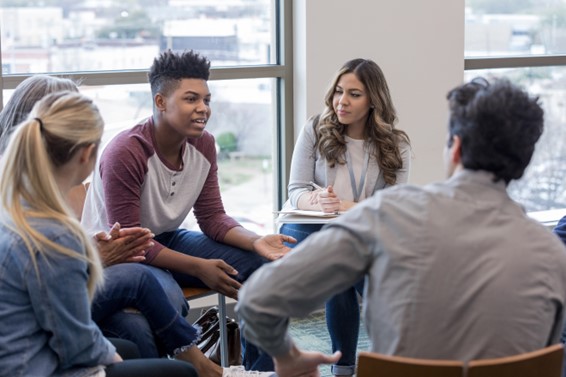Team-Based Learning at NIC
by Jen Wrye, Teaching and Learning Faculty Developer
Last spring, two groups of faculty at NIC participated in the Centre for Teaching and Learning Innovation’s inaugural Team-based Learning (TBL) Course Redesign Institute. The sessions focused on the principles of team-based learning, as well as student learning, engagement, and metacognitive skills more generally. I had a chance to catch up with several attendees to see how that learning experience changed their teaching. (For an introductory overview of team-based learning, click here).
Faculty across NIC’s campuses and programs, and using various modalities, described a variety of experiences with team-based learning adoption. Everybody enjoyed the spring redesign session, whether they’ve implemented TBL fully, in part, or have yet to take that plunge. Indeed, a few individuals who have not taught using team-based learning planned to spend some of their professional development time redesigning their fall 2024 or winter 2025 courses and using team-based learning.
Instructors using team-based learning resoundingly reported that this approach led to considerable benefits. In my interactions, improvements to four specific areas emerged: (1) student engagement; (2) student preparation; (3) interpersonal relationships; (4) overall learning.

A key benefit of TBL is its backward design. Faculty who teach with TBL spend most of the class meeting asking students to tackle significant problems in the field rather than lecturing on the course content. The means students, to be successful, must attend class with some base knowledge, ready to apply it as needed and share it when prompted. In his adoption of TBL, English instructor, Sean Hickey, observed: “team-based learning has made a big difference in terms of keeping students more engaged and staying on top the readings.” Sean also noted that TBL also provided him with a better sense of overall student preparation, allowing him to “record/measure it as opposed to trying to infer it through questions and individual participation.”
Many faculty members remarked on how solving problems in class can drive student interest in their courses. Biology faculty, Aisling Brady, felt that team-based learning made a big difference in the delivery of a difficult course. She explained that this is an important course in science education that is also widely known to be content-dense. Students tend to drag through it, but using TBL has helped them engage with the material and each other much better. Ryan Blaak also makes the point that in-class exercises give his history students a great opportunity to work with primary documents, just as historians do in their professions.
In team-based learning, modeling students’ learning after professional expectations is a powerful learning tool. Barb McPherson observed that practical nursing lab instructors felt the students who had taken the preparatory theory course, which used TBL, were better prepared to execute the skills required in a clinical environment. Importantly, the students themselves also felt more prepared and confident. These are considerable benefits that promote quality learning for students and great teaching experiences for faculty!
As is true with all teaching experiences, faculty certainly faced some challenges with the integration of TBL in their courses. Some hope to improve their readiness-assessment test questions while others plan to work on their in-class activities. Faculty also hope to explore possibilities for bringing in principles of UDL and ungrading into future iterations. Overall, faculty using TBL expressed excitement about what their courses will become in the future.
The Centre for Teaching and Learning Innovation will continue supporting faculty with their reflections and adaptations, offering several TBL-themed learning sessions this Spring 2024.
- May 6 – Team-Based Learning Sharing Celebration
- May 23 – Creating Effective 4S Problems
- May 30 – Doing Team-Based Learning in Digital/Hybrid Courses group
- June 12 – Topic TBD
For more information about these sessions or anything team-based learning related, contact Jen Wrye and jen.wrye@nic.bc.ca